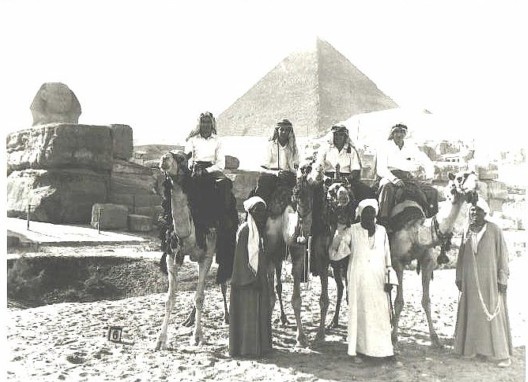
Leisure time on board & ashore |

An archeological visit ? "London Resolution" 1959 |
Breakdowns were a time for shark fishing |







Leisure Time How did we spent out time, when not eating, sleeping or on a run ashore? The following were not practised on all vessels on any one voyage but all were done at some time or another depending on the people on board. Board games chess, draughts etc World wide trading The board was a chart of the world and each player had a marker representing a type of merchant ship By throwing the die you moved your ship around the world picking up cargo, say furs from Russia for the UK market, but to deliver the cargo meant facing problems of delay due to bad weather, strikes, lack of available bunkers at a suitable price to allow the voyage to be profitable. Then there were insurance premiums, claims and crews wages to be met. Card games solo, cribbage, bridge, brag, pontoon, poker Conversation Aided by an occasional glass of amber nectar, wide coverage of the last ship (best/worst), characters, weather, ports visited, runs ashore. But by tacit agreement this excluded the topics of politics and religion. Darts Dominoes Drawing and painting Films Supplied by the Seafarers Society also exchanged with UK V/L's. Fishing By hand - flying fish to be dried and varnished By rod, - spinners used to catch garfish By line and winch - to catch sharks as large as possible Model making Everything from a model submarine of biscuit tin metal to a working dingy made from scraps of dunnage. Music From a concertina to skiffle band to accompany our singing Make do and mend The Indian crews bought treadle sewing machines and made their own shirts etc. Ouija board Photography Ornithological, shipboard views, crew, events. Radio The BBC World Service was always popular especially when we were heading for hot spots eg Korea, Malaya, Aden, Canal, Cuban crisis. Reading From the ships library supplied by the Seafarers Society. Shooting With .22 calibre rifle with USA ammo cheap and unlimited quantity. Swimming Shipboard homemade pool, proper ship pool, in the sea if vessel is anchored Studying Studying for the next examination Table tennis Writing letters Writing home, also mathematical ready reckoners for use on board Listening to the radio We all carried our own radios on the ship which had an internal aerial system which could be switched off if the bridge was taking DF bearings DF - Direction finding Listening to shore based radio beacons and finding the direction they came from laying the bearing on the chart and where the lines cross was your position in theory. But not accurate very often in fact. The use of personal aerials was forbidden because they introduced errors into the readings which we got from the DF and we needed the best information possible from the DF as we only used it in fog when no sights had been possible and we were so far from land we could not use the radar or the radar had broken down. Our favourite programmes were:- 1. BBC short wave World service signature tune "Lilliburlero" 2. Merchant Navy programme signature tune " A Life on the Ocean Waves" by the Royal Marines Band. The programme originally last thirty minutes but was cut back to fifteen minutes. A regular presenter was Alan Villiers an Australian bosun who became a master of a sailing vessel. 3. Radio Lourenco Marques, Mozambique We could hear this almost anywhere in the Indian ocean and it was very popular as it was almost continuous music and very similar to Radio Luxembourg which was already familiar. 4. AFN American Forces Network A world wide service for the American military and had plenty of music, especially the big band sound, jazz, new singers, country and western. 5. Local radio In the Persian Gulf there were two radio stations. Radio Dahran American and one in Kuwait where one of the most frequently requested records was three minutes of the noise made by rain falling onto a corrugated tin roof. Our favourite music at that time included continuous melodic music with rhythm played on the piano played by Charlie Kunz, Russ Conway, Winifred Attwell, Fats Waller. Big bands : Glen Miller, Tommy Dorsey, Benny Goodman, Humphrey Littleton, Chris Barber. Scots music from Jimmy Shand's accordion Band Singers : Eartha Kitt's "Just and Old Fashioned Girl" Joe Stafford's " The Old Rugged Cross " Kay Starr's "Wheel of Fortune " Classical music was very popular ************************************************ Shopping trips |
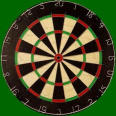
Trips ashore |
Family outing ashore in Athens |
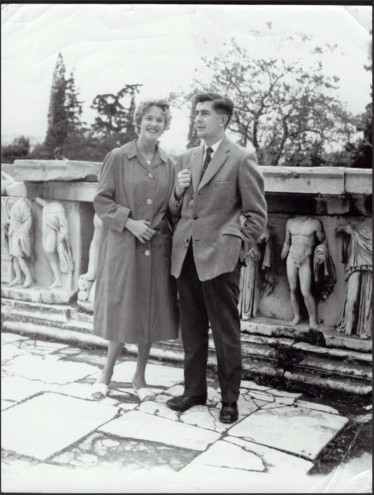
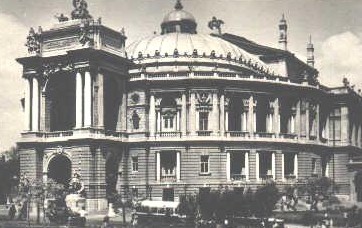
Odessa Opera House |
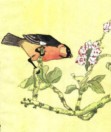
I enjoyed watercolour painting |
When joining a ship you had to be prepared for a voyage of unknown duration and parts of the world so you took what you could to be prepared. You took with you a radio that worked on ships voltages and did not rely on batteries. You also took enough razor blades to last a while in case you were not trading in civilised areas of the world and you could not get ashore. You could also elect to use a cut throat or Rolls Razor (a self sharpening razor) otherwise an electric razor was the alternative. Soap was not a problem because the ship issued Lux toilet soap or red lifebuoy soap and also original carbolic soap and the brown bell bar soap for cleaning.A chip of carbolic soap when put into the mouth causes the heart to race, the pulse to quicken and the temperature to rise, just as happens when someone is having a hear attack. As we were to find out when someone desperately wanted to leave the ship. When needing to restock the type of shopping facilities varied greatly : 1. Lone traders would board the ship with the Master's consent and in the smoke room they would open their suit cases and display their wares. 2." Bum boat" men would offer their goods from the boat and you made sure that the goods came up first before you put the money in the basket or the boatman would sail away with your cash 3.When near civilisation we would buy our stores from the Seamens' Mission or if we could we would go into town When in Naples the British Vice Consul who knew Valerie's father took us to Pompeii and Bahia. He also took us to an imposing house in the country where they made and sold cameos. The establishment was very grand and the assistants were dressed in claw hammer jackets and pin striped trousers . The goods were displayed in grand cabinets but the Vice Consul insisted that we should haggle with the assistants as that was the way that things were done in Italy. When in Santos, Brazil, in a high fashion jewellery shop I haggled very well and bought seven large butterfly trays and wall plaques for £6.This was because I paid in pounds and not in Cruzeiros that were in massive inflation at that time. People were paid daily as the price of bread doubled overnight or so I was told. My prize example of shopping was when I wanted to buy a 21st birthday cake for Alan the other apprentice. We were in Dakar, Senegal, West Africa, standing in a native market that was selling cobra skins, native leather, straw work and bright cloth. I had no local currency only Italian lire, Greek drachma, and one US dollar. I could not speak any language in common, not the local French patois. I needed a confectioner's shop which sold iced birthday cakes. This I did and the French- speaking sympathetic assistant understood both my problem and my hand gestures, without which I would have been dumb. She also converted my foreign money into local and with her help Alan got his cake. |
